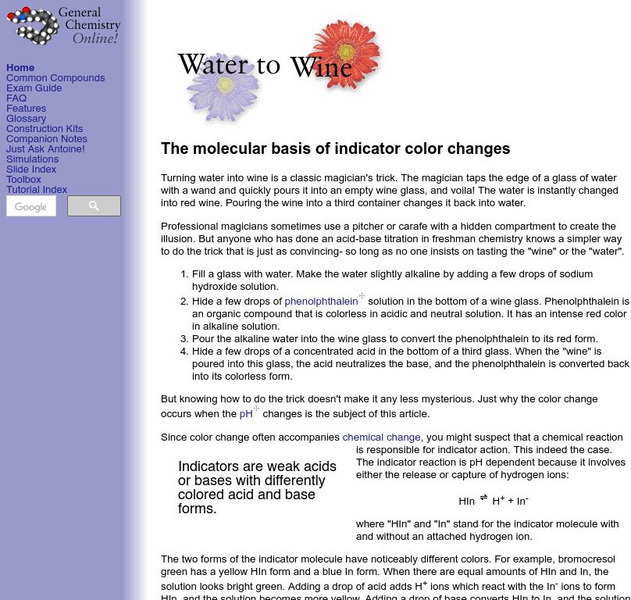Museum of Science
Museum of Science and Industry: Online Science: Color Changing Carnations
A popular plant experiment where food coloring is added to the water that flowers sit in, to see how this affects the color of the flowers. It demonstrates how water travels through the xylem of a flower stem.
American Chemical Society
Inquiry in Action: Using Color to See How Liquids Combine
An activity where students use the characteristics of liquids when they combine with water to tell the differences between them. Activity includes both student and teacher instructions.
American Chemical Society
American Chemical Society: Best of Wonder Science: Ice of a Different Color [Pdf]
An experiment to test what happens to water when salt or sugar is added and it is then frozen into ice cubes. Students also explore the ice's physical properties by rubbing cubes on sandpaper and dropping a heavy object on each type.
Frostburg State University
General Chemistry Online: Water to Wine
The molecular basis of indicator color changes. Includes Chime structures for the acid and base forms of phenolphthalein, methyl orange, red cabbage indicator, and cyanidin diglucoside.
TeachEngineering
Teach Engineering: Dna Forensics and Color Pigments
Students perform DNA forensics using food coloring to enhance their understanding of DNA fingerprinting, restriction enzymes, genotyping and DNA gel electrophoresis. They place small drops of different food coloring ("water-based paint")...
Science Made Simple
Science Made Simple: Why Leaves Change Color
This is a site that offers answers to some often hard to answer questions such as why do leaves change colors. Provides an easy to understand answer to the question along with a section that students can read on their own, a puzzle,...
Roy the Zebra
Roy the Zebra: Reading Games: High Frequency Words: Tom's Color Game
Help Tom the zebra get ready for bed in this interactive game. Drag each color word next to the box with the matching color and give Tom one item he needs for bedtime. After giving him socks, a blanket, hay, and a glass of water, watch...
Center of Science and Industry
Cosi Columbus: Coffee Filter Rainbows
Science experiment that demonstrates chromotography. Includes full list of materials, procedures, and scientific explanation of what happens with different colors when they are soaked with water.
ArtsNow
Arts Now Learning: Monet's Magic [Pdf]
In this lesson, 4th graders will learn about the impressionistic painter, Claude Monet. Students will learn how to paint fuzzy (up and down strokes) while mixing tints, creating the illusion of water. They will also learn to do color...
NASA
Nasa: Dynamic Ocean Topography With Current Arrows
Color-coded image of ocean currents depicts directional flow and speed of the currents across the globe.
PBS
Pbs Teachers: Paper Towel Chromatography Experiment
Observe the separation of colors derived from black marker ink by wicking water through a marker line on a paper towel.
Optical Society
Optical Society of America: Optics for Kids: Black Is Black or Is It?
An experiment with a coffee filter and a marker to see what happens when water touches a black dot, or any other color. With links to several scientific, academic articles that explain what is happening.
Indiana University
Indiana University Bloomington: Geo Notes: Peacock Coal [Pdf]
Describes a type of coal called "peacock coal" due to its iridescent color streaks.
Other
Norval Morrisseau and Medicine Painting
Norval Morrisseau, a Canadian Ojibwa, is the founder of Woodland school of Native American medicine painting.
National Weather Service
National Weather Service: Precipitation Analysis
This interactive map of the US is color coded to show the quantity of rain received throughout the country. Selections can be made to focus on certain areas and certain time frames.
TeachEngineering
Teach Engineering: Glowing Flowers
Student teams learn about engineering design of green fluorescent proteins (GFPs) and their use in medical research, including stem cell research. They simulate the use of GFPs by adding fluorescent dye to water and letting a flower or...
Other
Chicago Herpetological Society: Cottonmouth
Great color photographs link to a regional map and additional information on the Cottonmouth snake.
Optical Society
Optical Society of America: Optics for Kids: Release the Rainbow
A simple activity to demonstrate how light separates into colors when it passes through water acting as a prism.
Other
Top End Sports: Hydration for Athletes
Find brief articles that will teach you about the importance of hydration and how to stay hydrated during sports and physical activity. Learn about choosing drinks, drinking enough water, and checking yourself for hydration and...
Science Education Resource Center at Carleton College
Serc: All That Glitters
This Ocean Explorer lesson plan (PDF) explores the questions: What colors, if any, are visible down in the deep sea? What is bioluminescence? Students will learn about white light (visible light), the quantity and quality of light as...
Other
The Pedosphere and Its Dynamics: Intro to Soil Science
This Pedrosphere site provides a twelve chapter overview of soil science. Numerous topics are discussed and each chapter has a self-test to test your knowledge on the different aspects of soil science. Some chapters are only previews.
Smithsonian Institution
National Museum of Natural History: American Mammals: Clymene Dolphin
The Clymene dolphin is distinguished from the very similar spinner dolphin by the shortness of its beak and its color pattern. Like spinners, they "spin," leaping high out the water and rotating (not a somersault, but a sideways roll)...
Wikimedia
Wikipedia: Shale
Originating as clay or mud, shale is a sedimentary rock formed by deposits of small particles by slow moving water. Wikipedia includes color images and discusses composition and deposition.
Royal Society of Chemistry
Royal Society of Chemistry: Kitchen Chemistry: Use of Salt in Cooking (1) [Pdf]
Instructions for experiments to see whether cooking green beans in salted water improves their taste, texture, or color.















